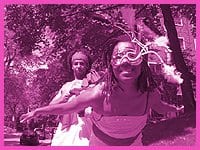For Jamea Zuberi, playing mas Trinidad style is one of the most liberating feelings possible. And her five-year-old dream that Toronto queers could experience the same feeling during Pride is finally coming true.
Five years ago, Zuberi and couple of her black queer friends met at a Jamaican diner called Mobay, then operating on Yonge St, to observe the Pride parade strut past the window. Unhappy with the lack of people of colour in the parade, she was struck by an epiphany – to bring Trinidad and Tobago’s Carnival tradition of playing mas to Toronto’s Pride.
The group hoped to mobilize enough people for the following year, but they found resistance to coming out on Pride Day stronger than anticipated. The idea fell through.
In an effort to create a queer space – albeit a stationary one – for black people on Pride Day, Zuberi then came up with the idea of Blockorama, where queer men and women of colour and their supporters would converge, dancing to the rhythms of the Caribbean. Surprisingly this idea leapt off the ground. Now in its fourth year, produced by Blackness Yes, it is one of the most successful stages on Pride Sunday. Zuberi resigned as chair in 2000 to return to her original dream – playing mas in Pride, this time with a hard-working group of queers of colour called Pelau.
Five years has made a world of difference.
Louis Saldenah’s Mas K Club, 13-time Caribana winner, has been approached to bring out his King And Queen Of Caribana costumes to parade with Pelau. His mas camp has been very supportive of Pelau in making their mas debut a safe and fun time for all on Pride Sunday. “The logistics of the sound system on the truck, safety, marshalling are just some of the advice Louis has given us,” says Zuberi. Plans are already in place to have their artistic team work with Mas K Club for hands-on experience leading up to August’s Caribana, now renamed Toronto Carnival.
As for the Pride committee, Zuberi says it has gone from not returning calls five years ago to providing wonderful support this year.
Backing isn’t across the board. The local Caribbean press often presents “we” versus “them” articles, arguing that there’s more funding for Pride and none for Caribana, that there’s a greater police presence in Caribana while there isn’t a big presence at Pride. But for Zuberi and her Pelau crew there is a definite co-relation between the former Caribana and Pride. “They are not seeing that Pride has been influenced by Caribana,” says Zuberi. “The idea of music trucks, costumed individuals and the very name of the ‘Market Place’ across from the Wellesley subway station is plucked right out of Caribana.”
She also feels left out, that the writers of these articles are missing a wonderful success story: That a queer woman of colour is bringing the Trinidad Carnival to Pride.
For the citizens of Trinidad and Tobago, the idea of playing mas burst out on the scene well over 150 years ago upon the emancipation of the many African slaves in 1834. Playing mas is about freedom, it is a feast of the flesh and a celebration of sensuality and sexuality – this ideal was previously unattainable to African slaves who were seen only as mating machines to supply more labour for the plantation.
Carnival day is a day of pride; it is a time when we truly unmask ourselves. All we ever wanted to do or say during the year can now be said and done in the two days of Carnival. Using the nectar of the islands, rum, to release their most hidden desires, very straight, upright men in the society take pleasure in crossdressing, wining and gyrating with other men on the streets for Carnival. It is an occasion when any form of homophobia is thrown out the door for the sake of having a good time.
Anyone can join the Pelau contingent in Pride. For $20 white-clad masqueraders get a mask that you can wear as a headpiece or on your face and two yards of coloured cloth to drape around your body or wave as a flag. The music truck, with DJs Verlia, Vashti and Blackcat on the controls, will play the wildest soca, reggae, Latin, chutney, rapso and bangra rhythms.
The Pelau band is titled Masquerade and the theme is “Playing mas in honour of cultural identities and celebrating sexual diversity.” Playing mas is about assuming a persona through dance or mime. It is up to you to come up with a costume that motivates you to move.
One traditional example is paying sailor mas, which started in Trinidad after World War II. Locals noticed the liberal behaviour of Yankee sailors stationed on the island and began re-enacting what they saw for Carnival. Sailor mas is still a popular masquerade for many steel bands.
Pelau hopes to introduce sections and characters next year. Spectators are encouraged to cheer the gyrating masqueraders and shake a leg as the music truck passes.
The same folks who were fearful of being seen parading down Yonge St on Pride day five years ago are now taking the liberating spirit of Carnival and placing it into Pride. Expect nothing but a burst of power for queer women and men of colour, their partners and supporters. Look out for Pelau Masquerade, as they bring this power to Toronto Pride.
* To play mas with Pelau Masquerade, e-mail pelau2002@hotmail.com and pick up your costume at the Pelau Fundraiser at The Pilot (22 Cumberland St) from 10pm on Fri, Jun 28; admission is $10. Look for Rhoma Spencer as The Lady Spencer with the Gran Bris Bois Orchestra on the North Pride Stage at 8:15pm on Sat, Jun 29 and at Blockorama at 7:20pm on Jun 30.

 Why you can trust Xtra
Why you can trust Xtra


